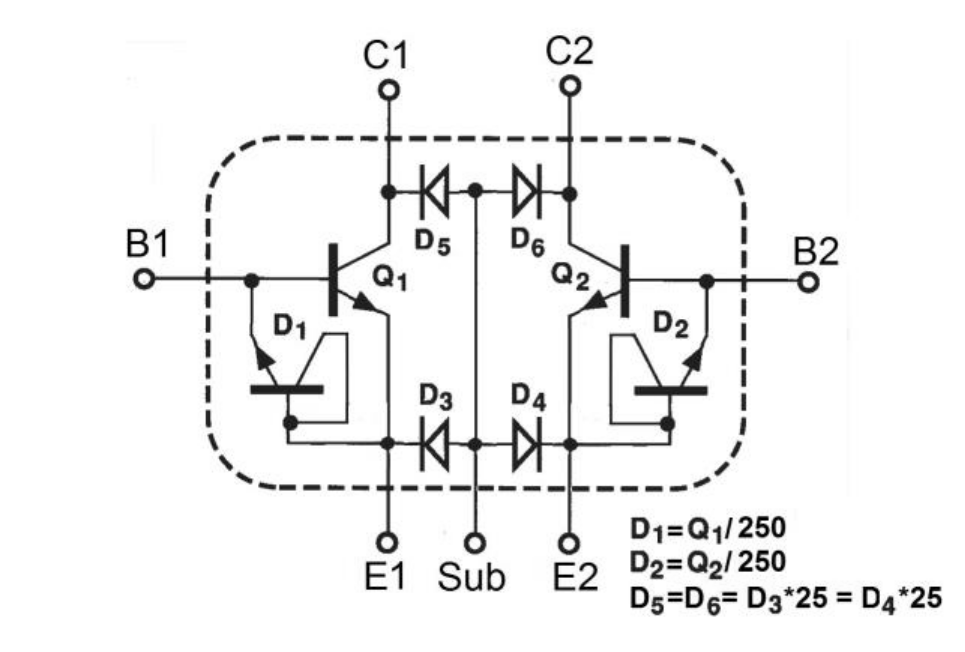Product information "Alfa Rpar - AS194H - Matched Transistor Pair"
The AS194 and AS394 are junction isolated ultra well-matched monolithic NPN transistor pairs with an order of magnitude improvement in matching over conventional transistor pairs.
Electrical characteristics of these devices such as drift versus initial offset voltage, noise, and the exponential relationship of base-emitter voltage to collector current closely approach those of a theoretical transistor. Extrinsic base and emitter resistances are very low, giving very low noise and operating over a wide current range.
To guarantee long term stability of matching parameters, internal clamp diodes have been added across the emitter-base junction of each transistor. These prevent degradation due to reverse biased emitter current- the most common cause of field failures in matched devices. The parasitic isolation junction formed by the diodes also clamps the substrate region to the most negative emitter to ensure complete isolation between devices.
The AS194H, AS394H, AS394CH are available in the 8-pin metal can TO5-8 package, the AS194DE and AS394DE in the 8-lead plastic SOIC-8 (150mil) EPAD package.
Features:
• "Ideal" and identical transistors
• Common-mode rejection ratio > 120dB
• Emitter-base offset voltage < 100v
• Emitter-base offset voltage temperature drift 0.1µV/°C
• Current gain (hFE) matched <2%
• Parameters are guaranteed in the range of collector current of 10µA - 1mA
• Noise Voltage Density of 1.8nV/srt(Hz)
• Ideal logarithmic properties
Electrical characteristics of these devices such as drift versus initial offset voltage, noise, and the exponential relationship of base-emitter voltage to collector current closely approach those of a theoretical transistor. Extrinsic base and emitter resistances are very low, giving very low noise and operating over a wide current range.
To guarantee long term stability of matching parameters, internal clamp diodes have been added across the emitter-base junction of each transistor. These prevent degradation due to reverse biased emitter current- the most common cause of field failures in matched devices. The parasitic isolation junction formed by the diodes also clamps the substrate region to the most negative emitter to ensure complete isolation between devices.
The AS194H, AS394H, AS394CH are available in the 8-pin metal can TO5-8 package, the AS194DE and AS394DE in the 8-lead plastic SOIC-8 (150mil) EPAD package.
Features:
• "Ideal" and identical transistors
• Common-mode rejection ratio > 120dB
• Emitter-base offset voltage < 100v
• Emitter-base offset voltage temperature drift 0.1µV/°C
• Current gain (hFE) matched <2%
• Parameters are guaranteed in the range of collector current of 10µA - 1mA
• Noise Voltage Density of 1.8nV/srt(Hz)
• Ideal logarithmic properties
| Basic Function: | Matched 2xNPN |
|---|---|
| IC Package: | TO5-8 (THT) |
| Pin Count: | 8 |
| Pin Pitch [mm]: | 1,94 |
| Technology: | THT |
Manufacturer / Hersteller:
ALFA RPAR AS
Ropažu iela 140
Vidzemes priekšpilsēta
LV-1006 Rīga
Lettland
alfa@alfarzpp.lv
Safety Instructions for Electronic and Mechanical Components
Intended Use:
• Electronic components, including potentiometers, knobs, switches, connectors, resistors, capacitors or integrated circuits (ICs), are designed for use in electronic circuits and devices.
• Use these components only for their intended purposes in electrical and electronic applications, according to their specified voltage, current, and environmental conditions.
• Any use outside the intended applications may result in malfunction or safety risks.
Handling and Installation
Installation:
• Handle electronic components with appropriate tools, such as tweezers, to avoid physical damage or exposure to electric shock.
• Ensure that the components are installed in the correct orientation and according to manufacturer specifications to avoid malfunction or damage to the circuit.
Storage:
• Store components in a dry, cool, and static-free environment to avoid damage from moisture, extreme temperatures, or electrostatic discharge (ESD).
• Avoid direct exposure to sunlight, which could affect component stability and performance.
Protection from Static Electricity:
• Use antistatic equipment (e.g., wrist straps, ESD mats) when handling electronic components to prevent electrostatic discharge, which can damage sensitive devices like ICs.
Compatibility:
• Make sure electronic components are compatible with the circuit in terms of voltage, current, and other technical specifications.
Warnings
Electrical Shock Hazard:
• Some components can retain charge even when disconnected. Use appropriate tools and take precautions when handling components to minimize the risk of electric shock.
Burn or Fire Risk:
• Overloading or misusing electronic components may result in overheating, which could lead to burning or fires. Ensure that components are used within their specified voltage and current ratings.
Danger from Misuse:
• Incorrect handling or use outside specified limits can damage the components or affect the performance and functionality of connected devices. Only use components within their specified tolerances and conditions.
Choking Hazard:
• Small electronic components can pose a choking hazard if swallowed. Keep components out of reach of children.
ALFA RPAR AS
Ropažu iela 140
Vidzemes priekšpilsēta
LV-1006 Rīga
Lettland
alfa@alfarzpp.lv
Safety Instructions for Electronic and Mechanical Components
Intended Use:
• Electronic components, including potentiometers, knobs, switches, connectors, resistors, capacitors or integrated circuits (ICs), are designed for use in electronic circuits and devices.
• Use these components only for their intended purposes in electrical and electronic applications, according to their specified voltage, current, and environmental conditions.
• Any use outside the intended applications may result in malfunction or safety risks.
Handling and Installation
Installation:
• Handle electronic components with appropriate tools, such as tweezers, to avoid physical damage or exposure to electric shock.
• Ensure that the components are installed in the correct orientation and according to manufacturer specifications to avoid malfunction or damage to the circuit.
Storage:
• Store components in a dry, cool, and static-free environment to avoid damage from moisture, extreme temperatures, or electrostatic discharge (ESD).
• Avoid direct exposure to sunlight, which could affect component stability and performance.
Protection from Static Electricity:
• Use antistatic equipment (e.g., wrist straps, ESD mats) when handling electronic components to prevent electrostatic discharge, which can damage sensitive devices like ICs.
Compatibility:
• Make sure electronic components are compatible with the circuit in terms of voltage, current, and other technical specifications.
Warnings
Electrical Shock Hazard:
• Some components can retain charge even when disconnected. Use appropriate tools and take precautions when handling components to minimize the risk of electric shock.
Burn or Fire Risk:
• Overloading or misusing electronic components may result in overheating, which could lead to burning or fires. Ensure that components are used within their specified voltage and current ratings.
Danger from Misuse:
• Incorrect handling or use outside specified limits can damage the components or affect the performance and functionality of connected devices. Only use components within their specified tolerances and conditions.
Choking Hazard:
• Small electronic components can pose a choking hazard if swallowed. Keep components out of reach of children.
Login


